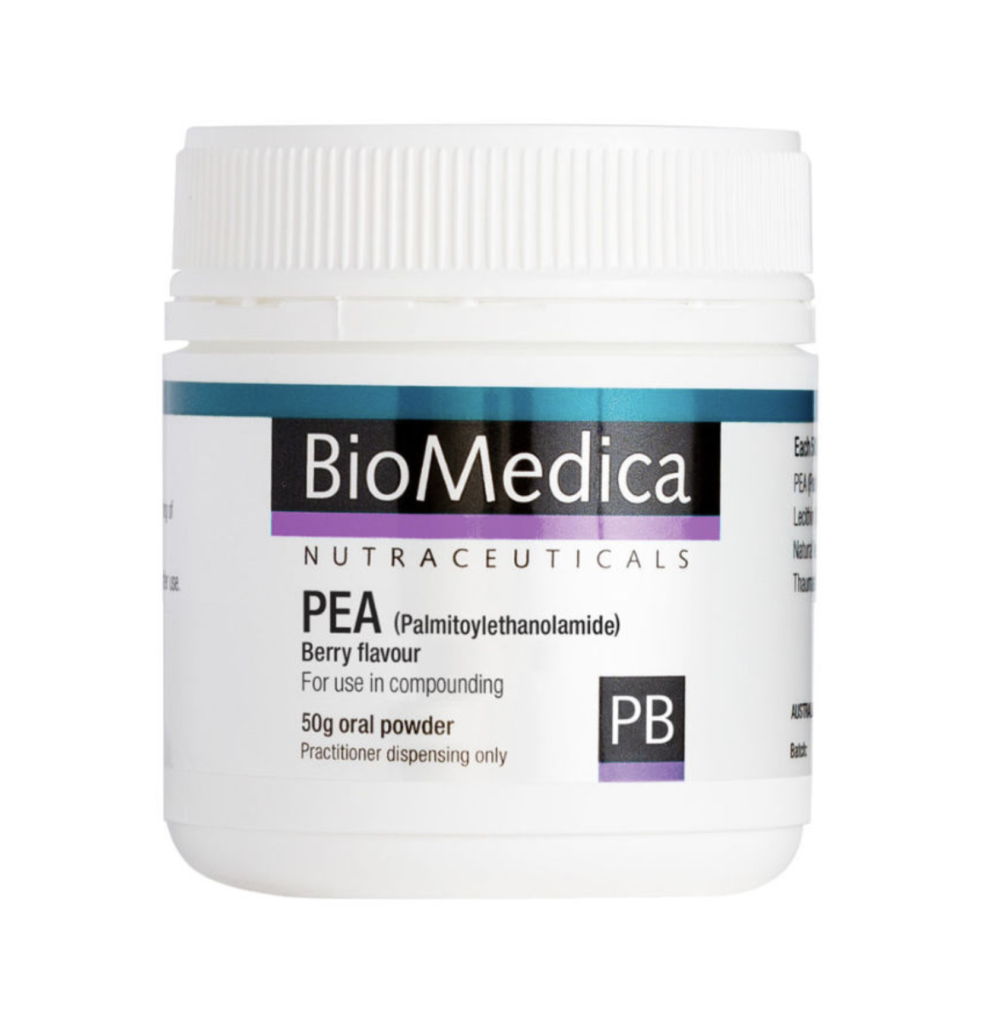
Palmitoylethanolamide (PEA) - Berry 50g
Please note that this product is only available to registered customers. Registration is easy, just click on the sign in/registration button at the top of the page. Registration allows us to give you the right prescription and ensure you get the best advice with dosing and treatment monitoring. Palmitoylethanolamide (PEA) is an endogenously produced cannabimimetic compound which has anti-inflammatory properties. Please read the full description below to find out more.
Product Information
Palmitoylethanolamide (PEA) is a nutritional supplement that acts as a novel anti-neuroinflammatory agent. This means that it acts to reduce inflammation in the central nervous system. It belongs to a group of endogenously produced bioactive lipids called N-acylethanolamines (NAE's) which contribute to the regulation of pain and inflammation. There have been a number of studies where PEA has been used to treat childhood conditions such as autism (1,2), migraine (3),eczema (4) and pain (5). PEA appears to be well tolerated with a good side effect profile. It are these properties which can potentially allow it to be used as adjunctive therapy for conditions such as Paediatric Autoimmune Neuropsychiatric Disorder Associated with Streptococcus (PANDAS), OCD and tic disorders. Dosing should be adjusted to take account of an adults or childs age and weight and therefore specialist input is necessary to ensure that this agent, although it is technically a nutritional supplement, is given safely and with monitoring. We supply this product on a prescription only basis for registered patients of the e-hospital this allows us to ensure that we provide you with the best service.
- Khalaj M, Saghazadeh A, Shirazi E, Shalbafan MR, Alavi K, Shooshtari MH, et al. Palmitoylethanolamide as adjunctive therapy for autism: Efficacy and safety results from a randomized controlled trial. J Psychiatr Res. [Randomized Controlled Trial Research Support, Non-U.S. Gov't]. 2018 Aug;103:104-11.
- Colizzi M, Bortoletto R, Costa R, Zoccante L. Palmitoylethanolamide and Its Biobehavioral Correlates in Autism Spectrum Disorder: A Systematic Review of Human and Animal Evidence. Nutrients. [Review]. 2021 Apr 18;13(4).
- Papetti L, Sforza G, Tullo G, Alaimo di Loro P, Moavero R, Ursitti F, et al. Tolerability of Palmitoylethanolamide in a Pediatric Population Suffering from Migraine: A Pilot Study. Pain Res Manag. [Clinical Trial]. 2020;2020:3938640.
Eberlein B, Eicke C, Reinhardt HW, Ring J. Adjuvant treatment of atopic eczema: assessment of an emollient containing N-palmitoylethanolamine (ATOPA study). J Eur Acad Dermatol Venereol. [Clinical Trial Multicenter Study Research Support, Non-U.S. Gov't]. 2008 Jan;22(1):73-82.
5. Passavanti MB, Alfieri A, Pace MC, Pota V, Sansone P, Piccinno G, et al. Clinical applications of palmitoylethanolamide in pain management: protocol for a scoping review. Syst Rev. [Review]. 2019 Jan 8;8(1):9.



